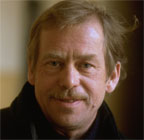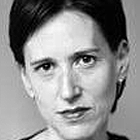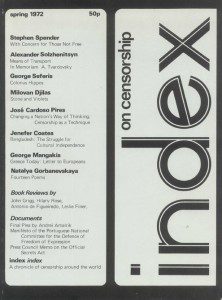Václav Havel dies: How Samuel Beckett and Havel changed history
Václav Havel, dissident, playwright, first president of the Czech Republic, and author of Charter 77 died today.
Republic, and author of Charter 77 died today.
Samuel Beckett wrote a play for Havel when he was in jail. On being freed, Havel returned the favour.
It was the making of a great dramatic double-act. In 2009, Index on Censorship editor Jo Glanville reflected on the relationship between the two
(more…)
Godot to the rescue
 Samuel Beckett wrote a play for Václav Havel when he was in jail. On being freed, Havel returned the favour. It was the making of a great dramatic double-act, reprised this week by Index on Censorship. Jo Glanville reports
Samuel Beckett wrote a play for Václav Havel when he was in jail. On being freed, Havel returned the favour. It was the making of a great dramatic double-act, reprised this week by Index on Censorship. Jo Glanville reports
In 1982, Samuel Beckett dedicated a new play, Catastrophe, to Václav Havel, then a political prisoner serving a four and a half year sentence for “subversive activities”. He had been asked to write the play by the International Association for the Defence of Artists, who were organising a special night of solidarity for the Czech playwright at the Avignon Festival that summer. Although Beckett had never met Havel, he was deeply concerned by the persecution of writers and artists in eastern Europe and was horrified to hear that Havel had been forbidden to write in prison.
“The fact that Samuel Beckett made himself heard in this way pleased and spoke to me immensely,” recalls Havel. “In my eyes, he was a patriarch or father of modern theatre, who dwelt somewhere up in the heavens isolated from the hubbub down below.” When Havel was released the following year, he returned the honour by dedicating a play, titled Mistake, to Beckett. This literary tennis match is a fascinating, if little known, footnote to the two writers’ careers. The two plays were performed together in Stockholm in 1983 and first published in Index on Censorship in 1984. This week, to mark the 20th anniversary of the fall of communism in eastern Europe, Index on Censorship is presenting a rare performance of the two works, for one night only, directed by Jo Blatchley, at the Free Word Festival.
It was Havel’s friend František Janouch who first asked him to write a play when he came out of prison. Janouch, a nuclear physicist, had been granted political asylum in Sweden in 1974. He then founded the Charter 77 Foundation, with Havel’s blessing, to support the dissident movement back home. On Havel’s release, Janouch asked him to contribute a play to a fundraising evening in Stockholm. Havel was at first reluctant. “I told him it will be a fantastic announcement that you are now free and you are the same Havel,” says Janouch. “I called him the week after and he said, “Well, the piece is ready.” He told me that I had stimulated him to write.”
Janouch had also served as a go-between, carrying an exchange of letters between Havel and Beckett. Soon after he was released from prison, Havel asked Janouch to deliver a letter of thanks to Beckett for dedicating Catastrophe to him. “For a long time afterwards,” Havel wrote in his letter, “there accompanied me in the prison a great joy and emotion and helped to live on amidst all the dirt and baseness.” According to Beckett’s friend and biographer, James Knowlson, Beckett was deeply touched by the letter. “He talked to me about the extraordinarily moving letter he’d had from Vaclav Havel‚ remembers Knowlson. “He was very interested indeed and very moved by the plight of Havel.”
Havel’s friend František Janouch then had the brainwave of asking Beckett if they could stage Catastrophe in Stockholm along with Havel’s new play Mistake. “We had six or seven of the best known Swedish actors who did it free of charge for one performance only,” says Janouch. “The director practically made it as one piece – so people who didn’t know the plays had a problem seeing where Havel ended and Beckett started.”
Catastrophe has been described as Beckett’s most overtly political play. “Beckett took political positions, he was against oppression, he was for individualism he was certainly against all forms of totalitarianism and fascism,” says James Knowlson. “But he had this view of art that it suggested rather than stated – if you got too explicit then you countermanded what you were trying to do. People might be put off by that and I think he had a reluctance to go into that area of didactic writing.”
The play for Havel is a very short work consisting of one scene, in which a director and his assistant prepare a mute figure for a performance, manipulating the actor as if he were a tailor’s dummy. He is a dehumanised figure at the mercy of their direction. His only expression of independence is to raise his head at the end of the play. Although there are inevitably a variety of literary interpretations of the work, Beckett’s intention seems clear at least in representing an individual act of resistance in the face of oppression. Beckett’s biographer James Knowlson remembers the writer’s furious response to a review of the play in which a critic had described the ending as ambiguous.
“I can still remember sitting at a table with him outside a café in Paris,” says Knowlson, recalling their conversation about the review. “He almost slammed down his fist on the table: “It’s not ambiguous. He’s saying: ‘you bastards, you haven’t finished me yet!’ He bashed the table with great vehemence. I was quite taken aback by it — it was clearly one of those things he felt very deeply about.
“And that seemed to me to epitomise Beckett. Beckett is about going on and persisting and not just about ending –– ‘you must go on, I can’t go on, I’ll go on’. That is a vein of dogged determination which comes through and which in fact however much you reify or reduce somebody to an object, a victim, none the less there is this resilience and the persistence of the human spirit. and that I felt was something that was very important and linked really right through his work.” Havel’s play Mistake is less oblique — a group of prisoners intimidate a newcomer who has failed to observe the rituals of their incarceration. Like the protagonist in Beckett’s play, the main character is mute. Each work complements the other as a study in the dehumanisation of an individual.
“The Beckett is looking at a lack of freedom of the spirit,” says director Jo Blatchley. “Havel is looking at what happens physically in that type of situation. We don’t know where they are, but they’re clearly prisoners and they’re recreating tyranny.”
Beckett’s most famous play, Waiting for Godot, came to symbolise the agony of the Czech opposition and when the communist government fell in 1989, protestors took to the streets of Prague with posters saying “Godot is Here”. The waiting was over. Beckett died that December – he lived long enough to see the fall of the communist government, but just missed Havel’s election as president.
For Index on Censorship, the staging of Havel and Beckett’s plays completes an historic circle. Index was an assiduous supporter of Havel, publishing his writing and interviews throughout the 70s and 80s. Its dedication to supporting writers under communism was at the core of its mission ever since it was first founded by Sir Stephen Spender and Michael Scammell in 1972. But on the 20th anniversary of the Velvet Revolution, Havel’s prescience and motivation in writing Mistake remain striking. Even though Havel had only just been released from prison, in ill health, he had a larger purpose in mind when he wrote his play. “Mistake was not intended simply as a kind of snapshot of prison life,” he declared at the play’s first performance. “In its modest way, it is meant to warn against the ubiquitous danger of the kind of self-imposed totalitarianism now present in every community in the world, large or small.” Twenty-six years since Havel dedicated his play to Beckett, the message remains as relevant as ever.
A shorter version of this article is published in the Guardian
Additional research Klara Chlupata and Roman Chlupaty
Jo Glanville is editor of Index on Censorship
Catastrophe and Mistake are being performed at the Free Word Festival on 17 September at 630pm and will be followed by a panel discussion with Misha Glenny and Vladimir Arsenijevic chaired by John Kampfner. To reserve a place email bookings@freewordonline or call 0207 324 2570
Samuel Beckett and Vaclav Havel
[vc_row equal_height=”yes” el_class=”text_white” css=”.vc_custom_1474815446506{margin-top: 30px !important;margin-right: 0px !important;margin-bottom: 30px !important;margin-left: 0px !important;background-color: #455560 !important;}”][vc_column width=”1/2″ css=”.vc_custom_1478505578743{padding-top: 60px !important;padding-bottom: 60px !important;background: #455560 url(https://www.indexoncensorship.org/wp-content/uploads/2012/01/magazine-banner2.png?id=80745) !important;background-position: center !important;background-repeat: no-repeat !important;background-size: cover !important;}”][/vc_column][vc_column width=”1/2″ css=”.vc_custom_1474721694680{margin-top: 0px !important;margin-bottom: 0px !important;padding-top: 0px !important;padding-bottom: 0px !important;}”][vc_custom_heading text=”SUBSCRIBE TO
INDEX ON CENSORSHIP MAGAZINE” font_container=”tag:h2|font_size:24|text_align:left” use_theme_fonts=”yes”][vc_column_text 0=””]Every subscription helps Index’s work around the world
![]() SUBSCRIBE[/vc_column_text][/vc_column][/vc_row]
SUBSCRIBE[/vc_column_text][/vc_column][/vc_row]

